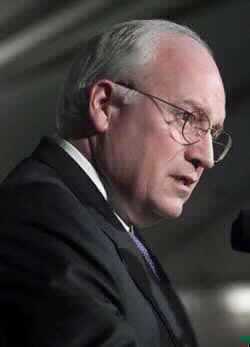U.S. Vice President Dick Cheney warned Monday that the United States could face devastating consequences from any delay in acting to remove Saddam Hussein as president of Iraq. Lawmakers urged President Bush to get their support before any invasion, even though White House advisers say congressional assent is not legally required.
Cheney's remarks were among the strongest by a high administration official about the urgency of ousting Saddam, spoken even as the White House contends no decision has been made to invade Iraq.
Speaking at a Veterans of Foreign Wars convention in Nashville, Tenn., Cheney dismissed what he called "deeply flawed" logic of people who argue against a pre-emptive strike to stop Saddam from developing chemical, biological or nuclear weapons.
"What we must not do in the face of a mortal threat is to give in to wishful thinking or willful blindness," he said. "We will not simply look away, hope for the best and leave the matter for some future administration to resolve."
Cheney pressed the administration's case for invading Iraq in face of growing misgivings about the potential loss of lives; the cost to U.S. taxpayers; the effects on other countries, friend and foe; and uncertainty about who would replace Saddam and how long the U.S. commitment would last. Many of the admonitions for caution have come from Republican lawmakers and officials of former GOP administrations.
"If this is a noble cause, and it's in the interest of our country, then the president needs to make the case," said Sen. Chuck Hagel, R-Neb., a member on the Senate Foreign Relations Committee.
Cheney's comments reflect growing unease within the White House: Aides acknowledge that Bush's critics are getting the upper hand because he can't make his case for ousting Saddam until he decides when and how to do it.
Congress has just begun exploring whether the United States should attack Iraq. The Senate Foreign Relations Committee held two days of hearings before the August break, and more hearings are expected in the fall in both the House and Senate.
If invoked, the War Powers Act, passed in 1973 late in the Vietnam War, would prohibit the president from waging war for more than 60 days without congressional approval or a declaration of war by Congress.
PHOTO CAPTION
Vice President Dick Cheney laid out the White House's case for pre-emptive action against Iraq on August 26, 2002, citing mortal danger to the U.S. and labeling critics as guilty of "willful blindness." Cheney used a gathering of the Veterans of Foreign Wars to reject fears that such action would undermine the global U.S. war on terrorism and mark a radical new departure for American foreign policy. Cheney is seen speaking in Washington in this April 17 file photo. Photo by William Philpott/Reute
- Author:
& News Agencies - Section:
WORLD HEADLINES


 Home
Home Discover Islam
Discover Islam Quran Recitations
Quran Recitations Lectures
Lectures
 Fatwa
Fatwa Articles
Articles Fiqh
Fiqh E-Books
E-Books Boys & Girls
Boys & Girls  Hajj Rulings
Hajj Rulings Hajj Fatwas
Hajj Fatwas














